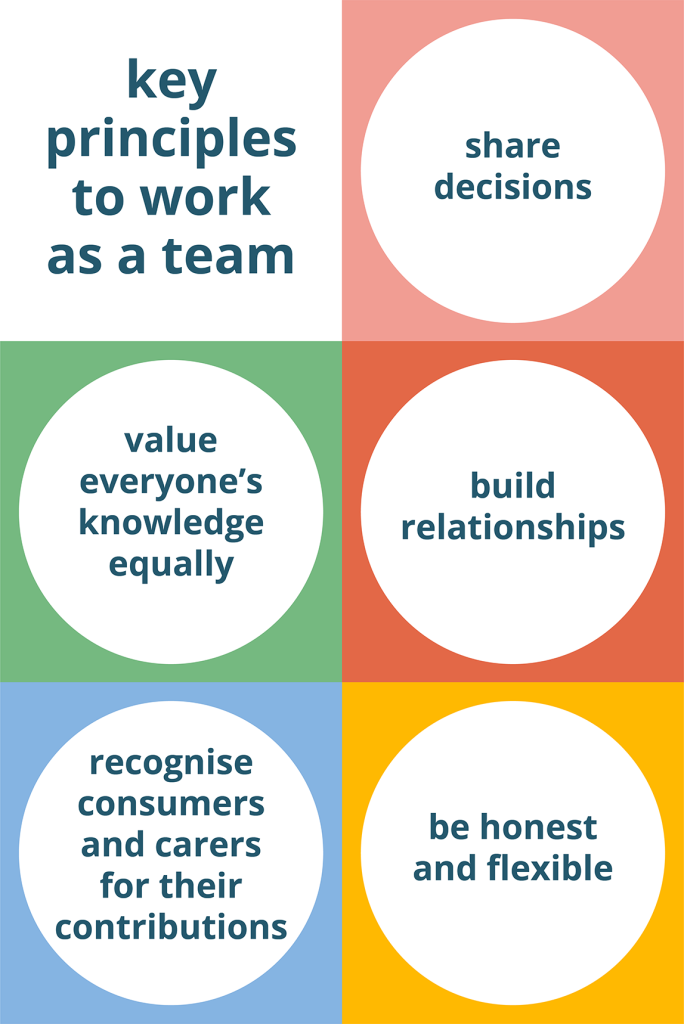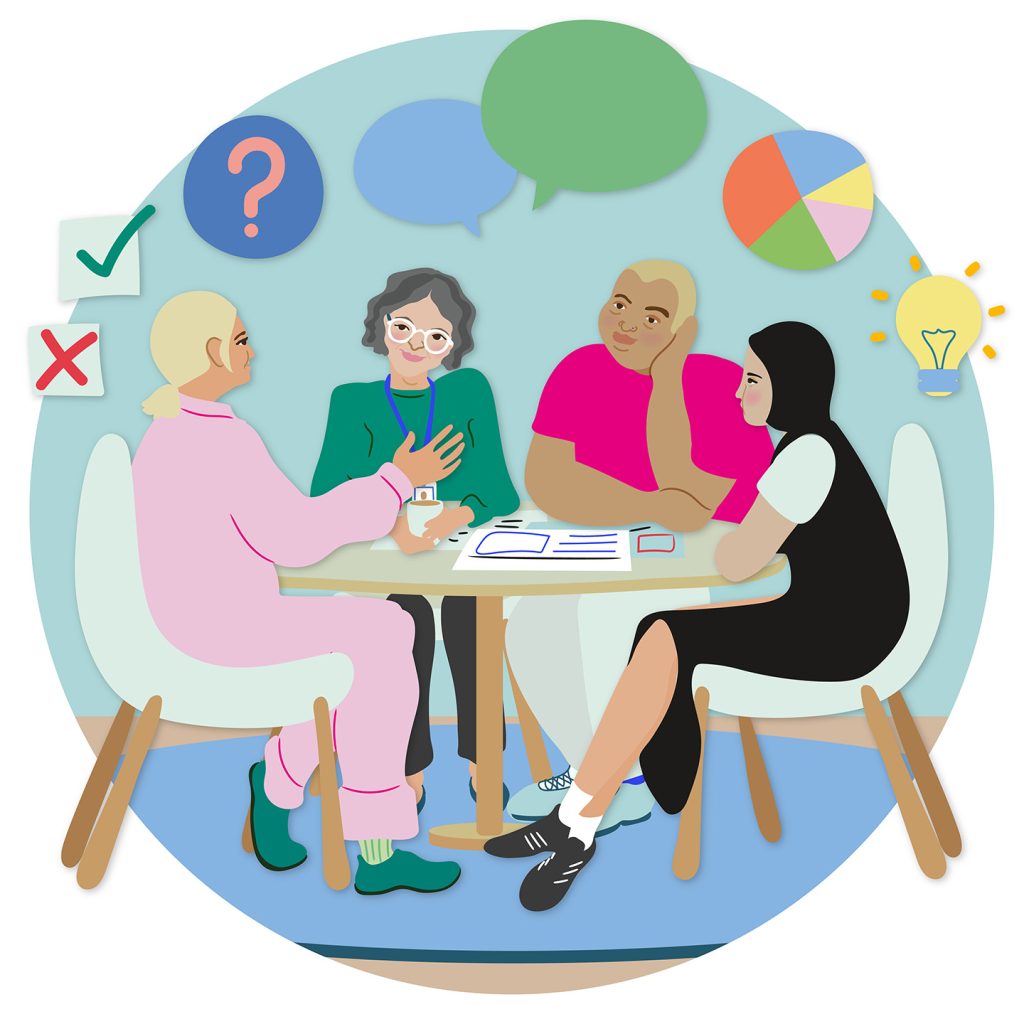- Home
- decide what to research
decide what to research
Take time to set priorities – use the key principles.
This phase involves people with lived experience as early as possible and can include:
- reviewing the strengths and gaps of existing research
- finding out what matters to consumers, communities and health workers
- doing forums and one-to-one conversations
- exploring and setting priorities (what matters most)
- exploring what outcomes consumers, carers, researchers and funders want
- setting up or working with existing lived experience leadership and governance
- talking about roles
- making partnerships
- getting letters of support from potential partner organisations
or something else.
Here’s what we learned from researchers, health workers and from existing resources [1,2,3,4].
- Build long-term community relationships.
- Treat consumers and carers as colleagues and partners, not only as participants. Work as a team from the start. Take time to build relationships.
- Run meetings and workshops with care and hospitality so everyone involved can participate. Be flexible with meeting times (including out of standard work hours), places (away from clinical places) and formats. Give choices. Ensure accessibility and welcome.
- Take time (more than one meeting) to build a shared view of strengths, needs and research priorities. (This takes time and more than one meeting.)
- Trust the advice and knowledge of people with lived experience about research needs and priorities, potential barriers to community involvement and what research approaches to use.
- Take time to understand and plan culturally safe and appropriate ways to work together as a team and in research activities.
- Think about if you’re the right person/people to lead the work.
- Don’t call something co-design that isn’t. (Check against the key principles.)
- Share your assumptions – for example, about what roles you’ll do, roles for people with lived experience, the methodology. You might find that your assumptions are wrong.
- Acknowledge issues with past research even if you weren’t involved.
Here’s what consumers and carers told us and we learned from other resources [1,2,4,5].
- Know how much input consumers can have.
- Get information in different formats (images, video, written, by mail) before meetings (e.g. a week before a meeting, not the day before) to think and prepare.
- Meet researchers who are warm, friendly, and open to changing how they work.
- Have time to build relationships and get to know each other’s skills, goals and strengths.
- Know if you are ready to use your lived experience, about your abilities and what roles you have time for around other commitments.
- Know what roles are available and what’s expected.
- Know what to expect from researchers and have someone to talk to if things aren’t going well.
- Share access needs.
- Have choices for when and where to meet as a team, including outside of clinical places.
- Take the time to co-decide on research priorities and questions.
words to actions
five practical suggestions to put the key principles into action when deciding what to research [download PDF]
other tools (not by us)
NSW Health – use power in partnership [website and video]
Health Translation SA – embedding community and consumer engagement in grant applications [PDF]
All of Us respectful engagement tools by NSW Health:
- Don’t give a presentation on what you want to do and ask for lived experience or health worker support in a single meeting. Instead, make time for consumers, carers and health workers to help set priorities and make decisions. This usually involves several sessions and might involve take-home community-friendly material for people to think about outside and between meetings.
- Don’t have one or two consumers or community members in a group made up of mostly conventional researchers and health workers. Instead, aim for 50% of people with lived experience on the research team.
- Don’t name the work before you’ve done it. It’s tempting to name your work before you start. Instead, use a placeholder name and then think deeply with community about what fits the project when the work is well underway.
- Don’t ask consumers or carers to speak for their communities. Know that a person only speaks for themself unless they’ve been endorsed as spokesperson for their community or have cultural authority to do so. Instead, involve a range of people.
- Don’t only include outcomes set by funders and researchers. Instead, ask consumers and carers what outcomes matter to them and work to include those outcomes where you can.
- Don’t assume consumers and carers will only advise and review. Instead, talk openly about roles. Acknowledge that consumers bring skills to the team and can learn new skills.
- Don’t go straight from first ideas to research proposals without checking what’s been done. Sometimes consumers, carers and health workers don’t know about existing research. Instead, learn together about where research is needed. That might involve sharing research that communities or workers don’t have access to or know about. Make time for communities to share community-led research and insights.
- Don’t assume consumers and carers only have lived experience and don’t have research and/or other professional skills (writing, design, public speaking or something else). Instead, be curious. You might ask about other skills consumers and carers bring to the team in a chat or induction.
[1] Western Australian Health Translation Network. (2021). Involving Consumers in Health and Medical Research: A practical handbook for organisations, researchers, consumers and funders. Retrieved from https://wahtn.org/wp-content/uploads/2021/09/WAHTN-CCI-Handbook_29092021.pdf
[2] Medical Research Future Fund. (2023). Principles for Consumer Involvement in Research Funded by the Medical Research Future Fund.
[3] Bellingham, B., Elder, E., Foxlewin, B., Gale, N., Rose, G., Sam, K., Thorburn, K., River, J. (2023). Co-design Kickstarter. Community Mental Health Drug and Alcohol Research Network, Sydney.
[4] New South Wales Government, Ministry of Health. (2023). All of Us: Six ways of working. Retrieved from https://www.health.nsw.gov.au/patients/experience/all-of-us/Pages/six-ways-of-working.aspx
[5] Australian Clinical Trials Alliance. (n.d.). Consumers. Retrieved from https://involvementtoolkit.clinicaltrialsalliance.org.au/consumers
go back – before you begin your research
go to the next section – decide how to research

